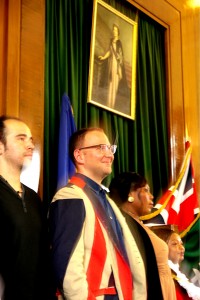Two very good pieces today bringing some semblance of sanity to balance the superheated indignation of the ruling elite.
First, Peter Oborne in the Telegraph who, like me, was struck by the hypocrisy implicit in the shock and outrage expressed in Parliament, in which MPs spoke about the week’s dreadful events as if they were nothing to do with them. “I cannot accept that this is the case”, he writes.
Indeed, I believe that the criminality in our streets cannot be dissociated from the moral disintegration in the highest ranks of modern British society. The last two decades have seen a terrifying decline in standards among the British governing elite. It has become acceptable for our politicians to lie and to cheat. An almost universal culture of selfishness and greed has grown up.
It is not just the feral youth of Tottenham who have forgotten they have duties as well as rights. So have the feral rich of Chelsea and Kensington.
Right on. Oborne goes on to recount a dinner party he went to in Kensington some time ago.
Most of the people in this very expensive street were every bit as deracinated and cut off from the rest of Britain as the young, unemployed men and women who have caused such terrible damage over the last few days. For them, the repellent Financial Times magazine How to Spend It is a bible. I’d guess that few of them bother to pay British tax if they can avoid it, and that fewer still feel the sense of obligation to society that only a few decades ago came naturally to the wealthy and better off.
Yet we celebrate people who live empty lives like this. A few weeks ago, I noticed an item in a newspaper saying that the business tycoon Sir Richard Branson was thinking of moving his headquarters to Switzerland. This move was represented as a potential blow to the Chancellor of the Exchequer, George Osborne, because it meant less tax revenue.
I couldn’t help thinking that in a sane and decent world such a move would be a blow to Sir Richard, not the Chancellor. People would note that a prominent and wealthy businessman was avoiding British tax and think less of him. Instead, he has a knighthood and is widely feted. The same is true of the brilliant retailer Sir Philip Green. Sir Philip’s businesses could never survive but for Britain’s famous social and political stability, our transport system to shift his goods and our schools to educate his workers.
Yet Sir Philip, who a few years ago sent an extraordinary £1 billion dividend offshore, seems to have little intention of paying for much of this. Why does nobody get angry or hold him culpable?
And as for the MPs. The idea of some of these moral cretins taking the ethical high road is simply staggering. There was Denis MacShane, for example, MP for Rotherham, explaining that “What the looters wanted was for a few minutes to enter the world of Sloane Street consumption.” Could this MacShane possibly be related to the MP who claimed (perfectly legally, I am sure) £5,900 for eight laptops?
And then there was the Labour MP Gerald Kaufman asking the Prime Minister to consider how these rioters can be “reclaimed” by society. Is he by any chance related to the Gerald Kaufman who submitted a claim for three months’ expenses totalling £14,301.60, which included £8,865 for a Bang & Olufsen television?
Mr Oborne is as nauseated as I am by the spectacle of Cameron taking the moral high ground. He talked a lot about morality, but only as something that applies to the poor. He would, he said, “restore a stronger sense of morality and responsibility – in every town, in every street and in every estate.” It never occurred to him that morality begins at home — in Downing Street. “The tragic truth”, Oborne writes, “is that Mr Cameron is himself guilty of failing this test”.
It is scarcely six weeks since he jauntily turned up at the News International summer party, even though the media group was at the time subject to not one but two police investigations. Even more notoriously, he awarded a senior Downing Street job to the former News of the World editor Andy Coulson, even though he knew at the time that Coulson had resigned after criminal acts were committed under his editorship. The Prime Minister excused his wretched judgment by proclaiming that “everybody deserves a second chance”. It was very telling yesterday that he did not talk of second chances as he pledged exemplary punishment for the rioters and looters.
There was a time — round the time when his young son died and he was running for office — when Cameron seemed to have the makings of a rounded human being. But it turns out to have been an illusion. What’s happened is that the shallow, oily, polished PR-flack that he used to be has reappeared. And he’s running a corrupt, morally-compromised, untruthful administration that is more divisive than anything we’ve seen since Thatcher at her peak.
The other note of sanity today was struck by my lawyer friend, Conor Gearty, writing in the London Review of Books. He casts a sceptical eye over Cameron’s newly-discovered taste for repressive legislation. “The police do not need any new legal powers to deal with the kind of disorder that has been seen this week in English cities”, he writes.
The Thatcher government’s 1986 Public Order Act put the crimes of riot and violent disorder on a statutory basis, with those convicted being liable to terms of imprisonment of up to ten and five years respectively. Despite the prime minister’s snide remark in the Commons yesterday, there are no human rights concerns, ‘phoney’ or otherwise, that prevent pictures of suspects being circulated if that’s the most effective way of bringing them to justice.
The stop and search powers that came into force in 1986 have already been greatly expanded by legislation in 1994 and 2000 and are already arguably too broad rather than too narrow: police harassment of young men from certain ethnic groups has clearly already been a cause of huge resentment.
Though the old Riot Act of 1714 has been repealed, the law allows the police (and for that matter the rest of us) to use reasonable force to suppress an ongoing riot. This elastic provision would allow, in extremis, the deployment of troops and the shooting of civilian rioters (and others) that might well ensue. The police already use firearms and – another legacy from the Thatcher era – have the legal right to possess (and therefore to use) water cannon, baton rounds (plastic bullets) and CS gas if such equipment is ‘reasonably required… to discharge their functions’. Likewise, whether you want to call it a curfew or not, the common law has long allowed control of the movement of people if it is judged necessary to curb or prevent breaches of the peace.
The issue is not one of legality; it is of capacity. This is what makes the plan to make deep cuts to police forces across the country so politically risky.
Yep. It’s such an obvious point that even Boris ‘Bullingdon’ Johnson gets it.


